

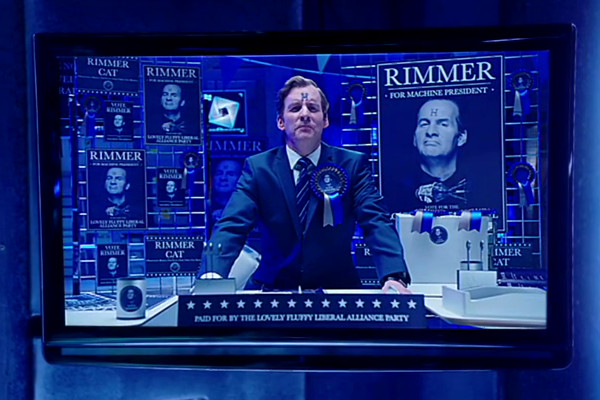
There's a commendable attempt to bring back some of the characterisation of old in this episode of Red Dwarf, and moments where Craig Charles appears to be playing Lister again, rather than just having Lloyd from Coronation Street voice the lines. Sadly, what may have been vaguely amusing in the old series, c. series four - Rimmer and Kryten compete to be elected President of Red Dwarf machinery - is buried beneath Doug Naylor's exhausted joke supply, to say nothing of Rimmer once more being the one-dimensional "prat" version.
It's worth remembering that Red Dwarf used to be a genuinely funny show, and with episodes like Thanks For The Memory, Rimmer also had some form of depth. Yet the last two series on Dave have felt like going through the motions, as the crew wander aimlessly without purpose, and reheated gags and situations are the order of the day; the series becoming its own "greatest hits" package, by way of third-rate cover version. There's some promise with Cat getting so old he needs glasses, but it's quickly dispensed with, and really it should be the age of Rimmer and Lister that provides the series its backbone.
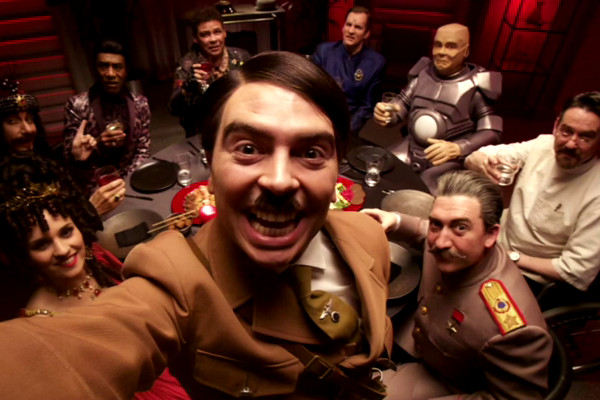
Series 12 is, in effect, series 11. All twelve episodes were famously shot in one block from November 2015-March 2016, with just a break during January. While series 11 had all but one of its episodes reordered from its production, series 12 went out as it was shot... except for Cured, which was filmed third on 12th February 2016, and brought forward to launch the "new" series.
It's understandable why, as it's one of the best efforts from a generally weak, lacklustre run. There's some genuine thought and inspiration, touching on the "war on terror", the nature of evil and Western exploitation of world events. And while a lot of it is a desperate scraping for laughs, typical with the Dave episodes, the plot does hang together reasonably well. Ultimately it's an "okay" episode of Red Dwarf which, in 2017, is, sadly, better than the average.
The episode was watched by 1.14 million viewers which, while only just over half of the audience for E4's Big Bang Theory, was the second most-watched programme on non-terrestrial UK TV. Initially the series maintained this general level, with the third episode, Timewave, even getting larger overnight figures than the series opener, something very rare. Unfortunately Timewave - at date of writing the lowest-rated episode on the IMDb - has been almost universally loathed by fans, and seems to have had a direct knock-on effect on the ratings. The following week only 0.91 million tuned in, with the programme dropping to ninth place in the non-terrestrial charts, and the week after this slide continued further, with a 0.84m rating (14th position).
It appears that the disastrous Timewave had a hugely impactful effect on the programmes' trajectory, and it remains to be seen if any future series can reverse this. However, while the series finale did not appear in the BARB top 30, this isn't as bad news as may be expected... BARB didn't collect data for the Dave Channels on the sixth week, so its audience went unrecorded.

Series 10 is the best of the Dave efforts, even if it doesn't really contain a single stand out episode. The reason for this is that, although the characterisation is tired, the jokes are leaden and, yes, Kryten's mask in series 10 is seriously off, there's a kind of earnest, well-meaning intent behind it all. Whereas the two follow-up series could be obnoxious on occasion, or just plain bad, series 10 is happy to coast along on a level of goodwill, presenting six episodes that are "not great, but not as bad as expected".
Red Dwarf was always a young person's show, with Craig Charles still in his 20s when the programme was last genuinely good. Here Charles is in his late forties, surrounded by older cast members making use of wigs, indulging in a "Red Dwarf meets Jesus" plot that's more Chelmsford 123 rather than anything actually amusing. But, while it fails to really raise more than the odd smile, and certain sections veer towards painfully unfunny, series 10 Red Dwarf scrapes mediocrity due to the fact that it's essentially harmless.

Watching the Dave series on Blu-Ray makes you appreciate how much effort has been put in. Unfortunately without Rob Grant in the co-writer's chair, Doug Naylor does tend to go for reliable, short-hand devices for his comedy, and the number of "instant reverses" in this one do get wearying.
Rather like watching a Bob Monkhouse stand up routine, the feeds are so heavily laboured and obvious that even the slowest of viewers would see the pay offs coming, and there's an over reliance on gurning, Chris Barrie often playing Gordon Brittas more than Rimmer in some of the Dave episodes. But, as the series 10 opener, this one contained a few smiles, and did, at least, prove that a semi-dignified comeback series was possible, even after so long away from screens...
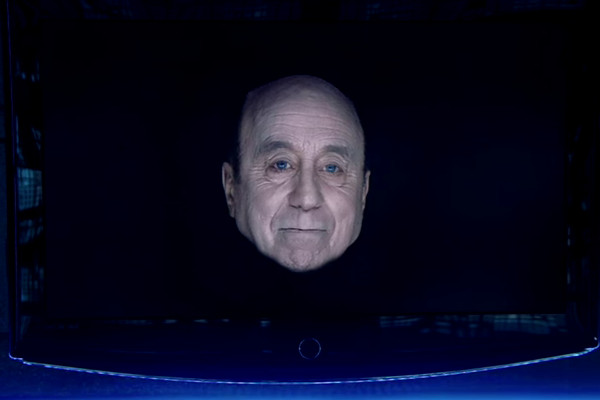
There's an odd start to this episode, with Lister claiming to have found the Captain's remarks on the crew, including himself and Rimmer. Rimmer demands that they shouldn't read them as they're not authorised... which is particularly strange as he had no such compunction in series one episode Waiting For God, where he got Holly to read him completely different Captain's remarks relating to him and Lister. This is the problem with a show that's become as anal and fan-serving as Red Dwarf in 2017... if you're going to base so much of your programme around continuity, you need to get it right.
Speaking of fan service, there's perhaps never been an episode as navel-gazing as this one. In a year where new Doctor Who can feature the 1966 Cybermen and an actor recreating the William Hartnell Doctor, we get Red Dwarf bringing back the original Holly and Captain Hollister, as well as multiple references to past plots. Granted, this kind of thing isn't exactly new to the show - it formed pretty much the entire backbone of series eight, 18 years earlier - but a recreation of the first bunk set from 1988 brings out an affectionate "ahhhhhhhhhhhh" from the audience. It's a story that references, not for the first time, dialogue from The End, inverting it, and so Red Dwarf completes what was perhaps always its destiny... to be a limited scope series aimed entirely at people who own boxsets and buy t-shirts. (Granted, The Anorak Zone is part of this demographic, but Red Dwarf used to be a programme watched by a wide audience of millions).
The call backs to series one only serve to remind how good the programme used to be, and while Norman Lovett manages to salvage some laughs with his material, the rest of the programme becomes a sketch show, with giant rat costumes and Craig Charles playing alternate versions of himself. Perhaps most surprising is that the crew seem to be as aware of parallel universes as they were the Captain's remarks, despite having encountered them several times before. Ultimately this is a fun albeit insubstantial episode, and one that broadcasts only to its core fanbase.
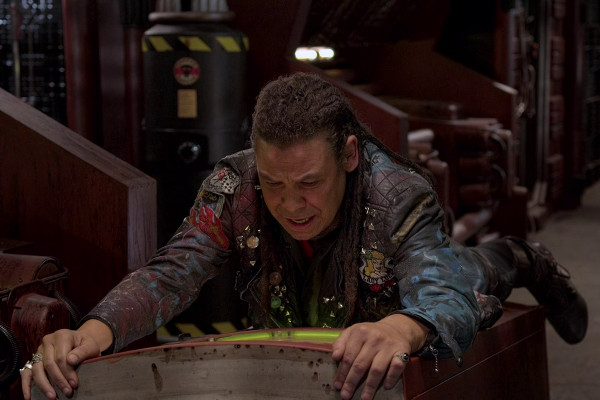
There's an odd moment at the start of Dear Dave where Lister cries with Kryten over the end of the human race. But it's not real tears, it's the kind of tears you could only do if you were a self-aware two-dimensional character in a sitcom. While the crew of Red Dwarf aren't quite at the level of guest characters in an episode of Some Mothers Do 'Ave 'Em, the Dave episodes do see them written uncomfortably broadly, with none of the nuance that they once possessed. That's not to suggest that Red Dwarf was ever particularly deep or meaningful but that, in the first couple of series at least, there was an attempt to draw real people in unreal situations. Sadly, the Dave comebacks are like the yearly publishing of the Beano annual in terms of characterisation.
The episode was reputedly written in just six days to replace scrapped episodes with higher budgets, and is very much a "bottle episode". This can perhaps be most clearly seen with Cat, who doesn't appear in the episode until over 12 minutes in. (Those really into anal trivia might note that his appearance in this episode runs no longer than 6'23 minutes). Yet it also occurs with the presence of Lister opening a letter from the past revealing he was a potential father. It's actually a fairly decent idea for a quickee plot, though introduced far too late into the episode - over halfway through - for it to really pay off.
Instead the episode meanders around with more of Rimmer-as-prat shenanigans, the aforementioned Kryten scene, and the odd sight of Lister flirting with vending machines. Even this idea has some merit, exploring the mental state of a man clearly suffering from depression. However, whereas previous years would have given Lister dialogue that indicated he really meant it - most notably series three's Timeslides - here it's just presented as something flippant and without true meaning, followed by three too-crass resolutions in a row. Despite all these criticisms, Dear Dave perhaps shows the most potential from series 10... it's an episode that, forced by lack of time and money, does what Red Dwarf always did best: focussed on the characters. It's just a shame they're no longer relatable people, and they don't have anything to say to one another.
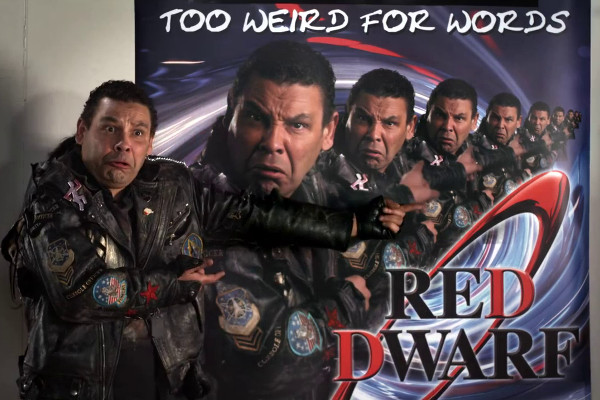
The second instalment sees the crew realise that they're all fictional TV characters. While quite a nice idea, this kind of postmodern, self-reflexive content was passé by 2009, a time when it was rarer to find a programme that didn't acknowledge its own artifice rather than one that did. There are some good moments in this one, including the series jokingly pretending it had excellent, (unseen) ninth and tenth series, but other parts, like a SF shop owner who finds them all hysterical, go on way too long.
Chris Barrie hasn't been ideally served by most of the Dave Channel offerings, which cast his character as the one-dimensional "sitcom" version of Rimmer, more Back In The Red than Thanks For The Memory. Although it's later revealed that the events of this story are a joint hallucination, seeing Rimmer coldly murder another hologram is significantly out of character, and Rimmer's line about "in what way am I hilarious? Name one way in which I'm hilarious" does, in 2009, exist as a valid question.
Those anal enough to wonder how the future still had video cassettes (as seen in several early episodes, including Me2 and Better Than Life) get an amusing, in-series explanation for how this came to pass as the cast see some DVD boxes in stores. While it's the kind of anal, fannish side of Doug Naylor that later gave us a recreation of the first scene from The End and the original bunk set, it's a nice "Easter Egg" for long-term fans.
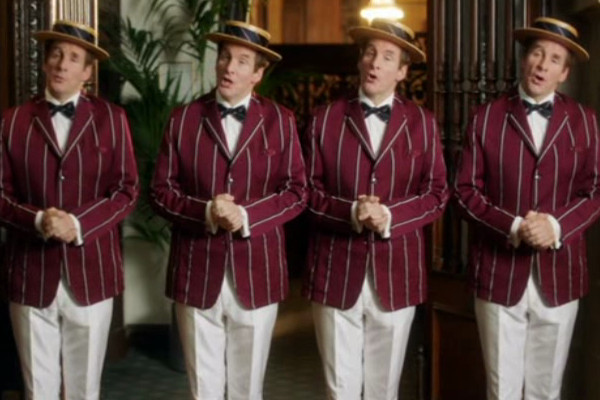
Although the Dave channel does well with what little resources it has, the budget is way too low for a show of this kind, and the struggles Doug Naylor has writing a series alone is only too clear on screen. It's commendable that the show is as good as it is, and a couple of decent episodes a series is perhaps more than can be expected from a show that's now over thirty years old.
Series 11 is plagued by particularly poor closing punchlines, and much discussion was in evidence on Twitter of the complete non-ending of this particular instalment. After such a decently constructed set-up, the final feeling is that the episode didn't end so much as they ran out of time. It's unfortunate, because, while incredibly broad and derivative of several other episodes, Officer Rimmer is one of the more amusing instalments of the series.
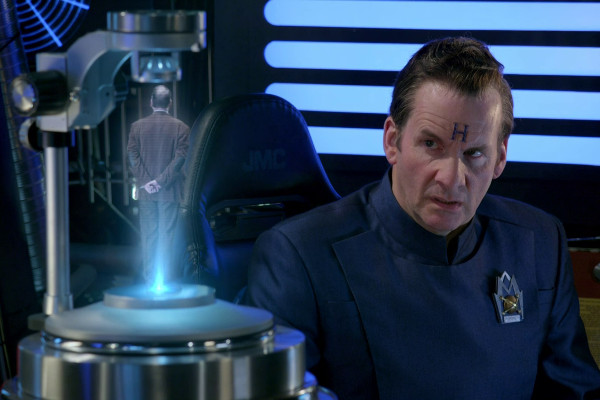
The Beginning is odd in that it gives us some backstory for Rimmer, but perhaps changes things we knew about his past. This is the problem with introducing "character" to the series, of course... it risks contradicting what came before. Though as the century of Lister's birth has changed throughout the show, it perhaps shouldn't be an undue concern.
This said, the Dave episodes of Red Dwarf are so aware of their past that this episode ends with Rimmer deliberately quoting The End - the title of this episode a clear reference to it, of course - so it's clear that it's aimed at long-term fans. This does make it confusing when the script contradicts what came before, with Lister making a particularly unamusing joke about Rimmer's last words before his death... when Rimmer's actual last words were so memorable and significant in Me2. And, it has to be said, long term viewers may be distracted by a different actor for Rimmer's dad, a necessity given that the highly memorable
John Abineri had died in June 2000.
Developed from elements of the unmade film script of 2000, The Beginning is quite a nice way to end series 10, as, while by some way the least amusing episode of the six, it does give us a recognisable Rimmer in places, instead of the prat version he's been playing the rest of the time. As a final episode of the entire programme this may also have worked even better... but it sees Rimmer finally rid himself of his neuroses, only with the full knowledge that he'll have to grow them all back in time for another series. Finally, look for a post-credits sequence which teases an unseen ending to the events of series eight, only for Rimmer to be interrupted...
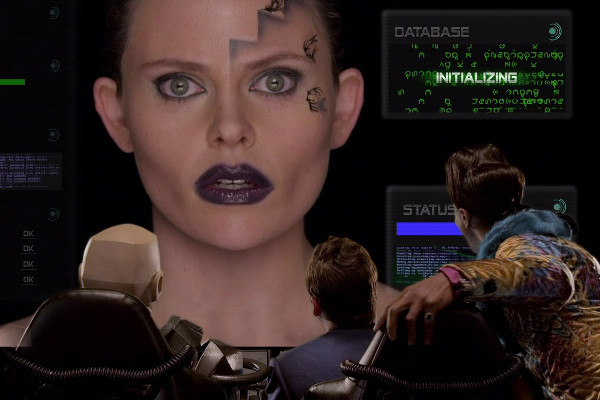
One of the fundamental problems with Red Dwarf is that, by its very nature, it has nowhere to go. Lister's plan to get back to Earth and settle down can never come to fruition otherwise it means the series would end, but the longer the programme goes on, the more pointless its lead character seems. Fathers and Suns is a commendable attempt to bring back some characterisation to Lister, even if the "Lister is his own father" stuff from Ouroboros is one of the most unfortunate plot developments of the post-Grant era.
While Dave celebrates Father's Day - without a thought given to his first two children, the twins - there's a plot involving a computer than can predict whatever the crew are going to say or do next (along with 90% of the audience) and a curious subplot involving the question of "Chinese Whispers" being racist. Putting aside any discussion over a Caucasian actor (Kerry Shale) voicing "Taiwan Tony", what's most curious about this is that it's the first time that racism has been introduced into the Red Dwarf universe. Although Lister's skin colour has been referenced on very rare occasions (in Justice he ponders over whether he could pass for Indian) the concept of racism has never really come up before.
Red Dwarf is an odd programme, in that it's a story of a white man in some form of authority, continually running down and telling a mixed race man that he's lazy, filthy and worthless. That this is never seen as anything other than the hatred of two individuals with no racial element involved is a testament to the writing of the series... by introducing the concept of racism into the far future, it does raise questions that probably weren't meant to be asked, in what is a very inconsequential subplot, there to fill time.